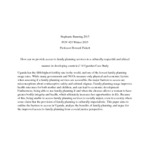How Can We Provide Access to Family Planning Services in a Culturally Respectful and Ethical Manner in Developing Countries? A Ugandan Case Study

View/
Author
Banning, Stephanie K.
Subject
Washington and Lee University, Shepherd Poverty Program
Birth control
Family planning services
Social change
Communication in family planning
Poverty
Capabilities approach (Social sciences)
Metadata
Show full item recordDescription
Stephanie K. Banning is a member of the Class of 2015 of Washington and Lee University. Capstone; [FULL-TEXT FREELY AVAILABLE ONLINE] Uganda has the fifth highest fertility rate in the world, and one of the lowest family planning usage rates. While many governments and NGOs measure only physical and economic factors when assessing if a family planning services are accessible, the major barriers to access are misconceptions about contraceptive safety and cultural stigmas. Family planning usage improves health outcomes for both mother and children, and can lead to economic development. Furthermore, being able to use family planning if and when she chooses allows a woman to have greater bodily integrity and health, which ultimately increases her opportunities in life. Because of this, being unable to access family planning services is socially unjust, even in a society where some claim that the provision of family planning is culturally imperialistic. This paper aims to outline the barriers to access in Uganda, analyze the benefits of family planning, and argue for the improved access to family planning from a social justice perspective.